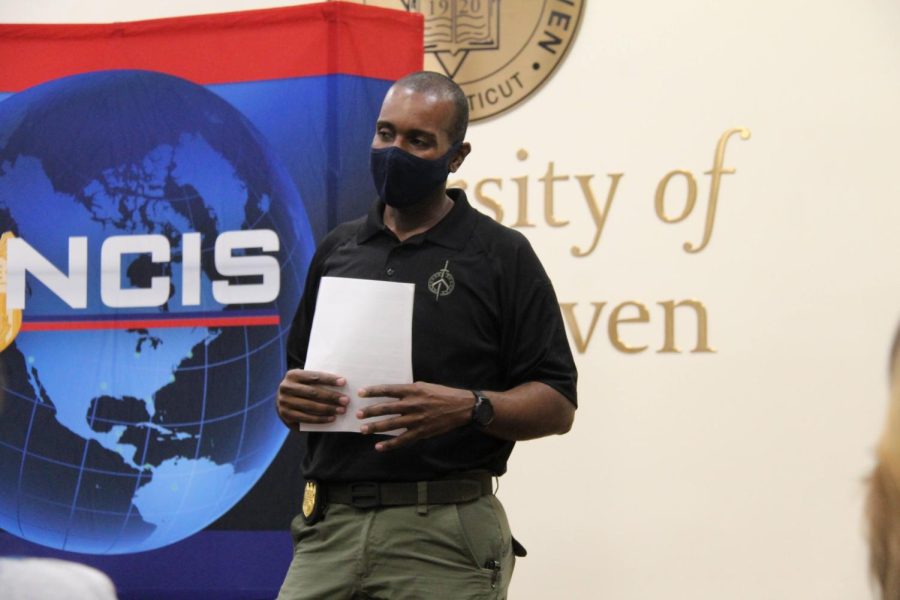NCIS agent shares experiences within federal workforce
Melvin Ramos speaks during the event in the Alumni Lounge, West Haven March 3, 2022.
“There is no typical day,” said Naval Criminal Investigative Services Agent Melvin Ramos, as he guest spoke for the American Criminal Justice Association (ACJA) last week about the processes surrounding work as a federal agent and his experiences in the line of work.
Ramos has worked for 22 years in law enforcement, and spent the past 11 with the NCIS, both as a standard agent and a member of the Regional Enforcement Action Capabilities Team (REACT), a move which he deemed “the best thing I could’ve done in my life.”
Describing the NCIS as a relatively small agency, which has transitioned into being fully civilian, he continued to develop a profound image of the structure and values of the agency.
The agency was formerly called the NIS; however, the first NIS director said “this name is stained; there’s no credibility, there’s no honor,” and hence the rename accompanied the restructuring.
Ramos said that “every agency has a different mission set,” and deemed four to exist within the NCIS: Criminal investigations (the “bread and butter”), counter-terrorism (his current field of work, which is “neutrualizing threats through proactive investigations”), counter-intelligence (in regards to foreign threats) and cyber-crime threats (to prevent hacking).
He described special agents as “basically detectives on the federal level.”
Agent Ramos spent much of his discussion centered around the mobility of working within the NCIS, a characteristic not as prominent in other federal agencies.
Unlike other federal agencies, Ramos informed his audience that the mobility agreement signed by agents is frequently acted upon within the NCIS.
For Ramos, the mobility opportunities drove his decision to choose this career. Students were granted the opportunity to submit questions prior to the speaker event, one of which asked, “Out of all of the different possible agencies, why did you choose NCIS?”
Ramos said, “I found an agency where if I get bored, there’s so many other things I can do.”
For those considering a federal agency job, Ramos provided information on what the experience is like. In terms of prospective skills in application, he said that “being an agent, you have to have time management skills,” as an average caseload on a daily basis ranges from 10-12.
He also placed an emphasis on the necessity of paperwork; because everything needs to be documented, there is an essential value to prioritization.
On the training program, Ramos shared what types of processes have changed over the past year. He said, “We’ve taken over the entire program, so now NCIS does your initial criminal investigator program, and the agency specific [training] is all blended into one” condensing the once 6 month long program into 4.5 months.
For those seeking to understand the entry rigor for the NCIS, Ramos provided the statistic that “it takes 100 applicants, on average, to fill a class of 24,” primarily due to the lack of predictability in which locations might request recruitment entrances at any given time. This ties back into his emphasis on the mobility of working for the agency.

Mia Adduci is a senior studying communication concentrating in multi-platform journalism and media who began writing for the paper her first semester on...







